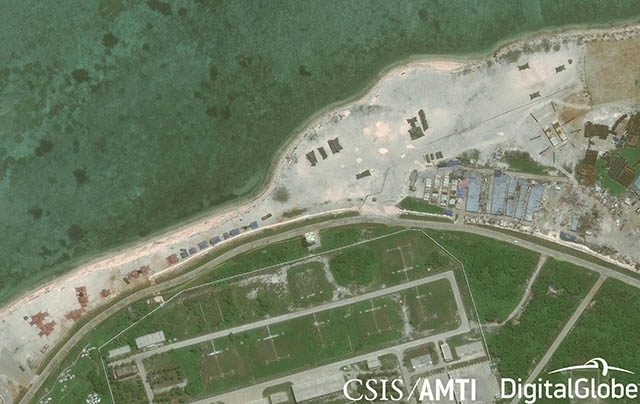
WASHINGTON — Two U.S. Navy warships sailed near South China Sea islands claimed by China on Sunday, two U.S. officials told Reuters, in a move that drew condemnation from Beijing as President Donald Trump seeks its continued cooperation on North Korea.
The operation was the latest attempt to counter what Washington sees as Beijing’s efforts to limit freedom of navigation in the strategic waters.
While this operation had been planned months in advance, and similar operations have become routine, it comes at a particularly sensitive time and just days after the Pentagon uninvited China from a major U.S.-hosted naval drill.
The U.S. officials, speaking on condition of anonymity, said the Higgins guided-missile destroyer and the Antietam, a guided-missile cruiser, came within 12 nautical miles of the Paracel Islands, among a string of islets, reefs and shoals over which China has territorial disputes with its neighbors.
The U.S. military vessels carried out maneuvering operations near Tree, Lincoln, Triton and Woody islands in the Paracels, one of the officials said.
Trump’s cancellation of a summit with North Korean leader Kim Jong Un has put further strain on U.S.-China ties amid a trade dispute between the world’s two largest economies.
Critics of the operations, known as a “freedom of navigation,” have said that they have little impact on Chinese behavior and are largely symbolic.
The U.S. military has a long-standing position that its operations are carried out throughout the world, including in areas claimed by allies, and that they are separate from political considerations.
Satellite photographs taken on May 12 showed China appeared to have deployed truck-mounted surface-to-air missiles or anti-ship cruise missiles at Woody Island.
Earlier this month, China’s air force landed bombers on disputed islands and reefs in the South China Sea as part of a training exercise in the region, triggering concern from Vietnam and thePhilippines.
The U.S. military did not directly comment on Sunday’s operation, but said U.S. forces operate in the region daily.
“We conduct routine and regular Freedom of Navigation Operations (FONOPs), as we have done in the past and will continue to do in the future,” U.S. Pacific Fleet said in a statement.
China’s Defense Ministry expressed its anger, saying it had sent ships and aircraft to warn the U.S. warships to leave, saying they had entered the country’s territorial waters without permission.
The move “contravened Chinese and relevant international law, seriously infringed upon Chinese sovereignty (and) harmed strategic mutual trust between the two militaries,” it said.
In a separate statement, China’s Foreign Ministry urged the United States to stop such actions.
“China will continue to take all necessary measures to defend the country’s sovereignty and security,” it added, without elaborating.
Contested Sea
Pentagon officials have long complained that China has not been candid enough about its rapid military build-up and using South China Sea islands to gather intelligence in the region.
In March, a U.S. Navy destroyer carried out a “freedom of navigation” operation close to Mischief Reef in the Spratly Islands.
Chinese officials have accused Washington of viewing their country in suspicious, “Cold War” terms.
China’s claims in the South China Sea, through which about $5 trillion in shipborne trade passes each year, are contested by Brunei, Malaysia, the Philippines, Taiwan and Vietnam.
The United States has said it would like to see more international participation in freedom-of-navigation operations in the South China Sea. —Reporting by Idress Ali in Washington; Additional reporting by Ben Blanchard in Beijing Editing by Alexander Smith, Alexandra Hudson and Lisa Shumaker



